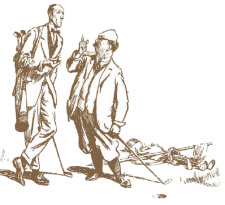Your Students Aren’t your Sounding Board
One of the things that we all share in common is the fact that life is not problem-free. And, that includes everyone. Even those who seem to have perfect lives have problems and concerns that must be addressed.
The same obviously goes for us as golf teaching professionals. We certainly have problems, which may range from the minor (our child has a minor illness) to the major (our house has lost much of its value). It might seem natural to share our problems with others in an effort to find empathy or solutions. There is indeed a time and a place for this, but during a lesson on the lesson tee is not one of them.
Students come to us with their own myriad of difficulties, one of which is their golf game. They are looking for an uplifting moment by coming to us for lessons. They want and expect us to help them with their golf games.
What they don’t expect is to be a sounding board for our personal problems. Even if we find out that our student is a practicing psychologist, we should definitely not burden him or her with our troubles. They didn’t come to us for that.
Now, all of this sounds rather obvious, but you would be surprised at the number of times we have heard golf teachers spill details of their personal problems onto their students. The student becomes uncomfortable, and from a business point of view, is not likely to visit that teacher again.
Think about this from the student’s point of view. They are struggling with their golf game, or, they are simply interested in learning how to play better. Their expectation is that the teacher will take an interest in their game, and perhaps some aspect of their life, such as what they do for a living. So, imagine what they are thinking when the teacher starts to burden them with this or that problem. The focus of the lesson is no longer on helping the student, but instead it’s on the teacher. That is not what the student had in mind when they originally signed up for the lesson.
On the other hand, this situation can be reversed. There are students who might want to burden the teacher with their personal problems. Unless we are trained psychologists (which we kind of are, truth be told), we should steer away from offering advice that is out of our realm. For example, if your student wants your advice on whether they should leave their spouse, well, what kind of advice could you offer that truly would be helpful? Probably none. However, if a student tells you they are having trouble with their car and you know of a reputable repair shop, that is another matter.
There is nothing wrong with trying to help our students with more than their games if we truly can offer competent advice. In fact, we have all known students who consider us as more than golf teachers, and they seek our advice on non-golf matters. If we want to help with non-golf matters, a good rule of thumb is to refrain from offering opinions in favor of factual solutions.
The bottom line is that people take a lesson, not only to feel better about their golf games, but to feel better about themselves. If we can accomplish those two tasks, we can consider that the lesson was successful. Deviating from this, such as unloading our personal problems onto our students, means that we have given a poor lesson, and of course that’s something we want to strive to avoid.





